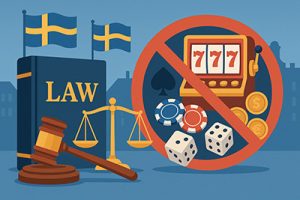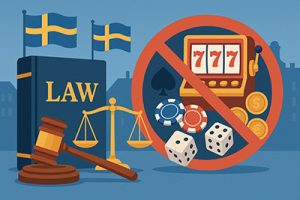
Sweden is preparing major changes to its Gambling Act following the release of a government inquiry led by investigator Marcus Isgren. The report, delivered to the Ministry of Finance, outlines new measures intended to strengthen consumer protections, secure state revenues, and clamp down on unlicensed gambling operators who continue to reach Swedish players through loopholes. If approved, the new rules are scheduled to take effect on January 1, 2027.
From Directional to Participant-Based Oversight
At present, Swedish gambling law applies only when operators are deemed to be “directed” at Sweden—typically through the use of the Swedish language, local currency, or specific marketing. This approach has left a gap in the system, allowing offshore companies to operate English-language sites with euro payments while still accepting Swedish customers.
Isgren’s report recommends abolishing this “directional criterion” and introducing a “participant criterion.” Under the new model, the key question would be whether people located in Sweden can access and participate in the game, rather than whether the site actively targets the market. To remain outside the Act’s scope, operators would be obligated totake concrete and effective steps to block Swedish residents.
The memorandum released by the Ministry of Finance (Ds 2025:23) highlights that this reform is designed to “exclude unlicensed gambling in a more effective way than is currently possible,” with the broader aim of deterring crime linked to gambling and bolstering consumer protection.
Expanded Ban on Promotion and Payments
The inquiry goes beyond site access, recommending tighter restrictions on those who facilitate unlicensed gambling. Current law already bans advertising for illegal operators, but the proposed changes would extend this prohibition to cover payment processors, financial institutions, and other service providers.
A presumption rule is also included. This would require anyone processing payments for gambling companies to assume that transactions involve Swedish residents unless there is definitive proof of foreign play. In practice, this measure would make it significantly more difficult for unlicensed operators to move money in and out of Sweden.
The inquiry further suggests amending criminal provisions, meaning both unlicensed gambling activity and the promotion of unlicensed services would be explicitly punishable under criminal law.
Government and Industry Response
Finance Markets Minister Niklas Wykman, who initiated the Gambling Act review in February 2025, welcomed the proposals. In his statement, he described the report as “a crucial step in creating a safer and fairer gambling market.” The next stage will see the proposals reviewed within the Government Offices before referral and parliamentary debate.
State-owned operator Svenska Spel also voiced its support. President and CEO Anna Johnson praised the recommendations, describing them as “long-awaited and welcome.” Johnson emphasized that “DNS blocking of illegal gambling sites is a natural next step to take. It would further strengthen the Swedish licensing market as well as the protection of Swedish consumers.”
Meanwhile, the Swedish Trade Association for Online Gambling (BOS) also backed the changes, particularly the shift to criminalising unlicensed operators that currently exploit regulatory loopholes. BOS secretary general Gustaf Hoffstedt commented: “This is an important contribution to the possibility of strengthening the Swedish gambling licence market, which is now proposed to criminalise almost all unlicensed gambling in Sweden. I foresee the government shortly submitting a bill to the Riksdag in accordance with the investigation’s proposal.”
BOS has long pushed for reforms, repeatedly warning that the directional criterion undermines the licensing system. In early September, the association called for a broader gambling inquiry to address market leakage, suggesting that relaxing strict bonus restrictions could improve channelisation. Hoffstedt argued that such a review would be “this government’s most important measure to protect and strengthen the legal regulated gambling market, before Sweden goes to the polls in September next year.”
Looking Ahead
The government inquiry arrives against the backdrop of Sweden’s channelisation rate—measuring the proportion of gambling conducted with licensed operators—falling to 85%, compared to 86% a year earlier. With the goal set at 90%, regulators see the proposed reforms as key to reversing this decline.
If the Riksdag adopts the recommendations, the new framework will come into force at the start of 2027, marking one of the most significant updates to Sweden’s gambling regulation since its re-regulation in 2019.
Source:
Scope of application of the Gambling Act, Ds 2025:23, regeringen.se, September 24, 2025.

